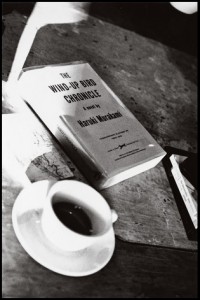To read her new memoir M Train you would hardly know that Patti Smith is a rock star. She doesn’t let on that at sixty-eight she’s a hard-working performer, touring, lecturing, doing benefit concerts, going to parties with fashion designers, making appearances with the Dalai Lama. In her sequel to Just Kids, her magical 2010 memoir of youth and art, Smith prefers to present herself as a sort of intercontinental, frequent-flying, literary flâneuse in search of the perfect writers’ café.
The title comes from her idea of the book as a mental train journey, with the writer as conductor: where Just Kids told a story, M Train is a loose collection of sketches and observations from a musician and poet between tours. We see Smith in bed with a cat in her West Village townhouse, watching The Killing and reading Murakami. We spot her in Japan at the grave of the filmmaker Akira Kurosawa; in Mexico taking pictures in Frida Kahlo’s house; in her neighborhood café eating breakfast (brown toast, black coffee) and writing poetry. She even gives us an international list of her favorite coffee houses, including Coffeeshop Bluebird in Amsterdam.
“It’s not so easy writing about nothing,” is her opening sentence; later she laments, “I’m sure I could write endlessly about nothing. If only I had nothing to say.” With this play on words she confesses the limits of the book: the something she has to tell, she’s not telling. In Just Kids she described her early romance with the photographer Robert Mapplethorpe, but in her new book she does not break her long-standing silence about the other great love of her life, the guitarist Fred “Sonic” Smith. After her marriage to Smith in 1980 she lived in semi-retirement in a Detroit suburb with him and their two children. A glimpse or two is all she’ll give away of her thirties. “An era of small pleasures,” she calls it, when she had a crib and a clothesline, got her coffee from 7-Eleven, did her best thinking in the lot behind the bait store, and was in a marriage she describes as a “clock with no hands,” “the silent synchronization of the jewels and gears of a common mind.”
She does tell us she and Fred began their relationship with a journey, visiting Suriname and French Guiana in homage to one of Patti’s heroes, Jean Genet. They also travelled in fantasy. When they bought an elegant vintage motorboat whose axle cost too much to repair, they put it in their yard and sat in it on summer evenings, Fred with beer, Patti with a thermos of coffee, listening to baseball games on the radio. Their happiness didn’t last. During a thunderstorm, a tree crushes their beloved boat; during another on Halloween 1994, Fred is taken to the hospital. He dies a few days later of heart failure, leaving Patti a grieving widow of forty-eight.
Her tone in these sketches is often melancholy, her theme often loss. She writes about the Arctic researcher Alfred Wegener, who disappeared on Greenland in 1930, and about her membership in the Continental Drift Club, a scientific society named for the theory Wegener proposed. Even a beloved, misplaced coat becomes a symbol of mortality. “Do our lost possessions mourn us? (…) Will my coat, riddled with holes, remember the rich hours of our companionship?”
Just Kids was full of people, the artists, writers, and musicians who influenced the young Patti and became her friends. M Train is full of ghosts. Many of the moody black-and-white Polaroids reproduced in the book are of gravestones, and her thoughts are often with Fred and other lost family and friends. Alone, she communes with the writers who speak to her in books. Through them she also recalls her younger self, the ambitious, starry-eyed poet in love with Rimbaud and Sylvia Plath.
The reader longs for more; but it’s not to be. Just Kids was a rich, full book about how to begin. This is a book about endings, about how to mourn and how to survive.
Trouw, October 17, 2015. Patti Smith, M Train (New York: Knopf, 2015), M-train (Breda: De Geus, 2015). Photo from the book via the New York Times.
